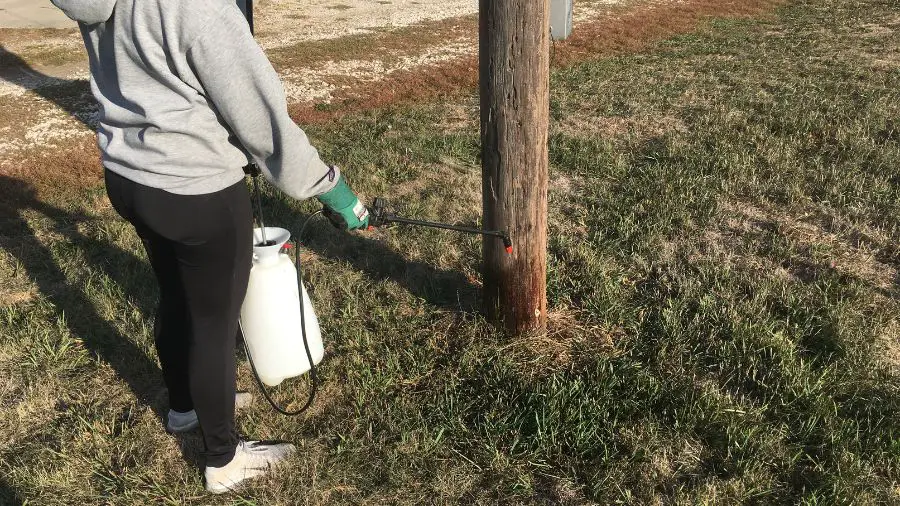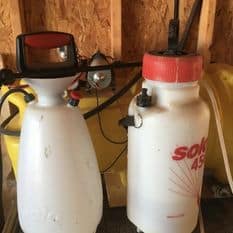When it comes to weed control, few products are as effective as Roundup. And although it is effective, it can be hard on equipment. If you need to apply Roundup for the first time you may be wondering, can I use my pump sprayer to apply it?
Yes, you can use a pump sprayer to spray Roundup (Glyphosate). I have used a pump sprayer for years to apply Roundup around my own residence. Some sprayers will last longer than others before issues like leaking and plugging may occur. Proper use of the chemical as well as cleaning out your sprayer is key if you want to use Roundup in a pump sprayer.
Typically, the vast majority of hand pump sprayers you can buy will work just fine with Roundup. There are of course several different variations of pump sprayers, and some will work better than others. So let’s break down the things to keep in mind when using a pump sprayer to spray Roundup.

What Types of Sprayers Will Work with Roundup
There are essentially two factors that will tell you if a pump sprayer can handle a certain chemical: the materials it is constructed with and can the pump mechanism handle the viscosity of the liquid.
Are the Sprayer Materials Compatible?
All the components of your sprayer must be compatible with Roundup or you will be dealing with leaks or rust in no time. Whether it is the tank, hose, spray wand, or the internal seals and o-rings. Fortunately, manufacturers of pump sprayers know that glyphosate is an extremely common herbicide. For this reason, they use materials that will work with it. If you are not sure or are using a sprayer that was not intended for herbicide here are the materials that will work best.
Roundup is corrosive to metals. Even when mixed with water, the chemical residue left behind can cause rust, especially when the sprayer is not thoroughly rinsed. So when it comes to a pump sprayer, it is best to stay away from metals, especially galvanized steel and iron.
A sprayer that will be used for Roundup should use components made of these materials:
Best options:
- Polyethylene Tank
- EPDM or Viton Seals
- EPDM Rubber Hose
- Polypropylene and Nylon spray wands
- Stainless steel strainer/filter screens
Will also work:
- Aluminum wands are ok but they tend to bend and break easily.
- Stainless steel tanks or spray wands will work fine but are usually a more expensive option than poly.
- Brass
- Braided Vinyl Hose
Can the Sprayer Pump Handle the Viscosity of Roundup?
Straight Roundup is a thicker liquid than water and is usually best pumped with a diaphragm pump. However, when you dilute Roundup in your spray mix the viscosity and weight of the mixture are similar to water. This means that a hand pump sprayer will have no issues producing pressure and spraying a water/Roundup spray solution.
Can You Leave Roundup In a Sprayer
If you have a mixture of Roundup and water in your sprayer after you finish spraying, you can leave it in your tank. The mixture should be fine to use again, but there are several factors that will affect how effective it will be.
When storing a spray mixture of Roundup and water, it is best to keep the sprayer out of direct sunlight. Keep in mind that dirty water or hard water can make Roundup less effective. So if you are starting with a tank or water source that may have some dirt or foreign material in it, your spray solutions effectiveness can become degraded.
If Roundup is mixed with another herbicide it may not be able to leave in the tank for long. It is common for Roundup to be mixed with other herbicides. This can also affect how long you would want to let this mixture sit in your pump sprayer tank. Mixing incompatible products in your sprayer can result in a sticky situation, literally. Improperly mixed products may produce a sludge that plugs up your sprayer wand, screens, or hose.
Any Roundup residue left in the tank can be hard on spray gun packings/seals. Triggers on your spray gun can get sticky if you leave chemicals inside the sprayer for longer periods of time without using or rinsing.
In an ideal scenario, Roundup and water mixture will keep for a long time and stay effective. After all, there are many premixed glyphosate products sold that may sit on the shelf for a long period of time before being purchased and ultimately used.
For best results, try to limit how long you leave your spray solution in the sprayer. If you need to keep it for more than a day, pour the remaining mixture out of your sprayer into another poly tank or an empty jug that has been triple-rinsed. Then you can rinse out the sprayer.
I use an older hand-pump sprayer tank to store chemical mixtures in between uses. This way I eliminate any chance of problems storing the mixture in the newer pump sprayer.

Can I Use the Same Pump For Roundup and Fertilizer?
You can use the same pump sprayer to apply Roundup and fertilizer. Depending on the fertilizer, you may be able to even mix them in the tank. If you are not sure if you should mix them in the same tank, you can use fertilizer then Roundup, or Roundup then fertilizer, simply make sure you rinse the sprayer in between.
Related: Can You Put Fertilizer In a Sprayer?
Is It Ok to Mix Roundup With Other Chemicals?
It is indeed ok to mix Roundup with other herbicides. However, the mixing ratios matter, and the order you add chemicals matters. Be sure to follow the instructions on the pesticide label to avoid any issues.
How Do I Clean My Pump Sprayer after Using Roundup
When you have finished spraying Roundup or any type of chemical for that matter, you need to rinse your pump sprayer with fresh water. Fill the tank about 10-20% with fresh water and gently shake the tank so that water washes over all the internal surface area. Then spray out the water through the discharge hose and spray wand, like you would if spraying. Repeat this process three times.
You can use a tank cleaner or neutralizer if you are going to switch to using a different chemical to spray on something that you don’t want any Roundup on, like your lawn. You can read more about cleaning your sprayer in my article on how to open a hand pump sprayer.
What is the Best Pump Sprayer for Roundup?
So what is the best pump sprayer for Roundup? Well, I don’t think I can say truly what the best pump sprayer is because I have not tried them all personally. However, I can say for sure that my Solo 456 has worked well for years.
I also can say that in years of experience with many different sprayer types, rinsing after use is key to prolonged life. It takes time but it is worth it.
Finally, almost every manufacturer of pump sprayers will have a small percentage of their product that does leave their factory with an issue. When you open the box on a new sprayer, inspect it for any issues. In fact, I would recommend filling partially full with water and testing it.
This way you can make sure there are no defects. If there is be sure to contact the manufacturer and have them resolve your issue. In most cases, they will get you a new sprayer or the pieces to repair the sprayer.

Things to Remember
Most hand pump sprayers designed for lawn and garden use will work ok with Roundup. For best results remember to follow the label instructions and rinse your sprayer after each use.
If you are looking to buy a pump sprayer for the first time, I wrote a full guide on how to select a pump sprayer for your specific application.

